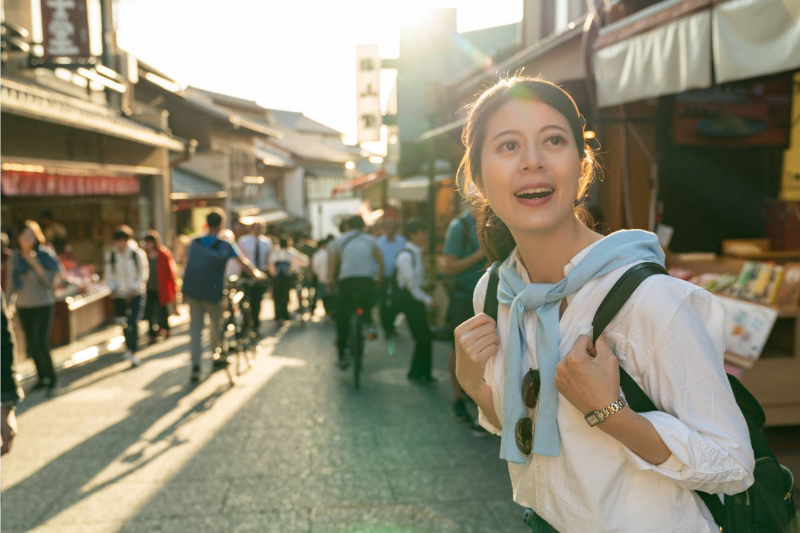Category: JapanTravelTips
Weather and Clothing Advice for Foreign Tourists Visiting Japan in August
2024-07-21
R. Asahida

August Weather in Japan
August is the height of summer in Japan, characterized by extremely hot and humid weather. Average temperatures across the country reach around 30 degrees Celsius (86 degrees Fahrenheit), and high humidity levels can make it feel even hotter. In urban areas, the heat can be intensified by the concrete and buildings, increasing the risk of heatstroke. It's essential for travelers to be well-prepared for this heat and humidity.
Regional Climate Differences
- Tokyo and Kanto Region: Tokyo and the surrounding Kanto region experience hot and humid weather, with average temperatures around 30-35 degrees Celsius (86-95 degrees Fahrenheit). The urban heat island effect can make it feel even hotter in the city.
- Kyoto and Kansai Region: Kyoto, Osaka, and other cities in the Kansai region are similarly hot and humid, with temperatures often reaching 35 degrees Celsius (95 degrees Fahrenheit). Kyoto, in particular, can feel sweltering due to its basin geography which traps heat.
- Hokkaido: In contrast, Hokkaido in the north has a milder climate in August. Average temperatures range from 20-25 degrees Celsius (68-77 degrees Fahrenheit), making it a popular summer destination to escape the heat.
- Okinawa: Okinawa and the southern islands are hot and humid with temperatures around 30 degrees Celsius (86 degrees Fahrenheit). However, being a tropical region, it also has frequent showers and occasional typhoons during this season.
- Nagoya and Chubu Region: The Chubu region, including cities like Nagoya, experiences similar heat and humidity to Tokyo, with temperatures around 30-35 degrees Celsius (86-95 degrees Fahrenheit). The region can also experience heavy rainfall.
- Fukuoka and Kyushu Region: Fukuoka and other parts of Kyushu have hot and humid weather, with temperatures around 30-35 degrees Celsius (86-95 degrees Fahrenheit). The region can also be prone to typhoons and heavy rain during August.
Clothing Advice
- Lightweight and Breathable Clothing: Choose materials like cotton or linen that are breathable. T-shirts, shorts, and sundresses are ideal for staying cool.
- Hats and Sunglasses: To protect yourself from direct sunlight, bring a wide-brimmed hat and sunglasses. These are essential, especially when walking around tourist spots.
- Comfortable Footwear: Since you'll be walking a lot, comfortable sneakers or sandals are recommended. Choose shoes made of breathable materials to keep your feet from getting too sweaty.
- Light Outerwear: Bring a light cardigan or shirt for places with strong air conditioning or cooler evenings.
- Footwear: Opt for comfortable and breathable shoes such as sneakers, sandals, or walking shoes. It's also a good idea to bring moisture-wicking socks to keep your feet dry. If you plan on visiting temples or traditional sites, remember that you may need to remove your shoes, so easy-to-remove footwear can be convenient.
Essential Items
- Sunscreen: The sun is strong, so always apply sunscreen when going out. Choose one with SPF 50 or higher.
- Water Bottle: Staying hydrated is crucial. Always carry water with you and drink frequently.
- Cooling Towels or Cooling Spray: These are useful for heatstroke prevention. Use them on your neck or forehead to cool down.
- Fans or Portable Fans: Handheld fans or portable electric fans are handy for keeping cool while on the go.
- Insect Repellent: Especially important in the evenings, insect repellent can help protect against mosquito bites.
Additional Tips
- Use Public Transportation: To avoid the heat of walking, use public transportation. Stations and bus stops are often air-conditioned.
- Visit Indoor Attractions: Plan visits to museums, art galleries, shopping malls, and other air-conditioned indoor attractions to escape the heat while enjoying your trip.
- Tour Early in the Morning or Late in the Evening: To avoid the peak heat, consider sightseeing early in the morning or late in the evening. These times are also less crowded, making for a more comfortable experience.
Being well-prepared and taking necessary precautions will help you enjoy your August trip to Japan comfortably. Embrace the summer and make the most of your travel experience.